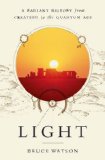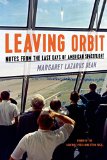Summary | Excerpt | Reviews | Beyond the book | Read-Alikes | Genres & Themes | Author Bio

A Portable History of the Universe
by Christopher PotterYou Are Here is simply an amazing book. Christopher Potter takes
his readers on a whirlwind tour that races from the vastness of the universe to
the subatomic particles that make up all of creation, touching on scientific
theory, history, and even evolution along the way. It is a fascinating journey
that can leave one's head spinning. There is a lot of information packed into
this slim volume.
Potter uses the clever technique of allowing exponentials of ten to enhance his readers' grasp of the immense (or infinitesimally small) distances and sizes about which he's writing. He lists, for example, items that are between 1 and 10 metres in length (humans, giraffes). Once the reader easily comprehends that distance, he progresses to items 10 to 100 metres long (pythons, some dinosaurs), and so on until he reaches distances of light years. This makes his subjects more approachable, providing a better sense of scale than if he had merely spouted facts at the reader. The information is peppered with remarkable observations that frequently cause the reader to stop mid-page in wonder.
One of the themes recurring throughout You Are Here is Potter's claim that scientists have been trying to prove humanity isn't "special" since Copernicus placed the Sun at the center of the universe, that our planet isn't unique. Yet, as scientists uncover more information about the universe, our world paradoxically becomes more remarkable. Potter points out that although there are many "Goldilocks planets" (just the right distance from their sun), the Earth and its solar system have other features that aren't present elsewhere that were essential to the development of life here.
Even the amount of uranium in the earth seems to be perfectly balanced for life. Too little and the earth would have cooled too quickly. It would have become something inert. Too much and the radioactivity levels would again have made this sort of life impossible. The level that we do have suggests that the sun is made of material from a third round of star making, which again reminds that not only are the conditions of the solar system finely balanced for our life, but the conditions of the universe are finely balanced too.
Potter's cosmology allows for the coexistence of science and faith. Early in the
narrative he quotes such scientific luminaries as Einstein and Hawking regarding
the possible existence of God. He includes a quote from American astronomer
Robert Jastrow on the last page of You Are Here: "…The scientist who has
climbed the highest peak may find 'as he pulls himself over the final rock,
[that] he is greeted by a band of theologians who have been sitting there for
centuries.'" While some purists may object to the insertion of spirituality in a
popular science book, its inclusion is not intrusive.
At times Potter's writing can be a bit dry. He tends to drift into
unnecessary recitation of data that does little to enhance the reader's
understanding of a subject. In addition, the book's publicists do it a
disservice in proclaiming its accessibility. Personally, I did not find this an
easy read. The central sections which deal with quantum mechanics, string
theory, and antimatter were particularly challenging. The reader is advised to
peruse an excerpt before picking up a copy - You Are Here
will not be everyone's cup of tea, and it's not a book that can be easily read in an
environment full of distractions. Regardless of its difficulty, however, I did
find the information Potter presented to be fascinating, and I was never tempted
to abandon the book. Readers with a background in science in particular are
likely to find much to enjoy here.
Interesting Link
An interview with the author at The Guardian.
![]() This review was originally published in The BookBrowse Review in May 2009, and has been updated for the
February 2010 edition.
Click here to go to this issue.
This review was originally published in The BookBrowse Review in May 2009, and has been updated for the
February 2010 edition.
Click here to go to this issue.

If you liked You Are Here, try these:

by Bruce Watson
Published 2016
Although lasers now perform everyday miracles, light retains its eternal allure. "For the rest of my life," Einstein said, "I will reflect on what light is." Light explores and celebrates such curiosity.

by Margaret Lazarus Dean
Published 2015
Winner of the Graywolf Press Nonfiction Prize, a breathtaking elegy to the waning days of human spaceflight as we have known it.
To win without risk is to triumph without glory
Click Here to find out who said this, as well as discovering other famous literary quotes!
Your guide toexceptional books
BookBrowse seeks out and recommends the best in contemporary fiction and nonfiction—books that not only engage and entertain but also deepen our understanding of ourselves and the world around us.